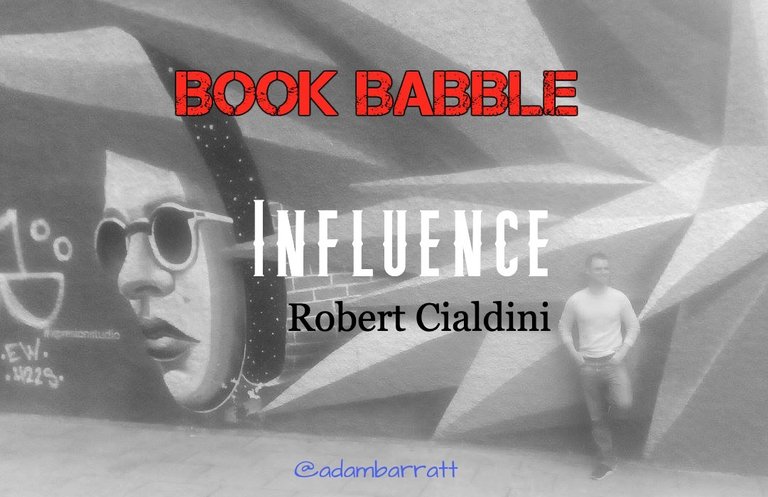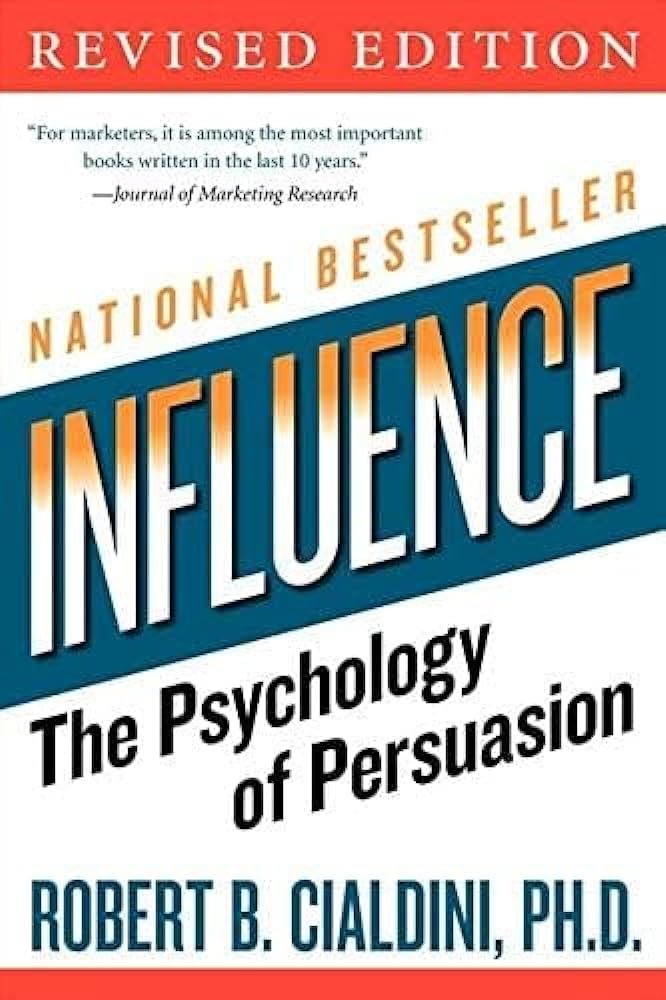"The psychology of persuasion"

It's been a while since I read this one but it's a classic in the sales and influence field and worth being covered in these Babbles.
Many have used it as a bible of sorts and a reference for this whole area. It was more written to avoid being on the receiving end of dodgy tactics, but can obviously used to get what you want.
Cialdini had brought together what he says are the 6 (now 7?) key influences in persuading others to follow a certain behaviour or take a particular action.
Instead of a bunch of quotes this time, I'll briefly go over the different principles and wrap it all up at the end…
With that said, what are these techniques we need to learn?
Reciprocity
This is simply the human nature of feeling an obligation to return a favour. If someone does something for you, you naturally want to do something back and may feel like you 'owe' them.
That primal urge can be used in giving a way a freebie or doing some action that then leaves a discord in the other's mind which may mean they buy from you or perform a positive action in return.

Commitment/Consistency
Staying true to the person you are and what you said you were going to do. If a person commits to something, they want to be seen as consistent to both themselves and the world. If someone takes a stand, they are likely to stick with that view unless there is a large force to push them away.
Tap into another person's worldview and offer them something that fits in with who they are and the values they hold. It can also be used in accountability in sticking to a course of action. Although, that has a down-side in the case of the sunk cost fallacy/bias.
Social Proof
Let's face it, we copy everyone around us if we like it or not. We consciously or unconsciously look around to see what others are doing and base what's 'right' on the general consensus (unless we actively rebel).
This can be used in many circumstances and is one of the most powerful forces out there. It could be termed the 'sheep factor', it's not necessarily a bad thing as it helps to keep us alive and make quick decisions… but just because others are doing it, it may not be the right course of action.
Once you see a few people doing something, you assume that it's been verified, but if it wasn't early on, each person could be making one huge assumption. Trust but verify.
Authority
Another of the most powerful influences. A figure of authority knows what they're doing and knows better than you. Right? Maybe, maybe not. Either way, we defer to those in a particular position, but they may be flawed, or acting on flawed information.
From our part, if we can convince people we are a figure of authority and an expert in our field, then we can get people to do what we want (to a degree). We were taught from a young age to respect different authorities without question, but alas, they must be questioned.
Have you ever seen the movie Compliance? This illustrates our deference to (perceived) authority very well and is a cautionary tale…
Liking
We say yes more to people we know, like and trust. Looking good and having a pleasing personality is going to work wonders. If you share common interests (or appear to) then you're in a similar 'club' and it's just a matter of transactions between friends. Of course faking it (and it being seen) is going to have the opposite effect.
No-one is really going to do business – or associate at all – with people they don't like.
Check out the BookBabble on Contagious by Jonah Berger as that talks about how ideas spread which ties a lot into the likeability factor amongst other things.
Scarcity
A classic sales tactic we've all seen. There are only a certain number of this product left or a certain time-frame before they're gone or the price goes up. Taps into supply and demand, and our fear of missing out (FOMO).
This can work across the board; if a person's time is scarce, you may make more effort than if it's freely given. It's not a good idea to be manipulative but good to bear in mind how the psychology works.
Unity
A 7th that's been added later…
That being, if you feel included you're more likely to participate. People want to be a part of something. A case of shared identity which ties in with our need to belong.
A fascinating book with concepts that all should learn in some manner. You don't really need to read the book if you don't want as you can get and study the principles you need quite easily. The book though is worth it for the background and expansion on these principles.
It delves into experiments and tells us how these drivers were arrived at and how best to use them to our advantage (both in using them ourselves, and being aware when others are using them on us).
Cialdini has since wrote a book called Pre-Suasion which is a follow on to this and is about influencing people before taking an action rather than at the time. Leading them in a certain direction without them necessarily knowing it. Advertising accomplishes this kind of thing, music, colours, suggestion etc. But that's a story for another day.
Check out Thinking, Fast and Slow from this series which also delves a lot into the decision making process and could complement this well (or Predictably Irrational for that matter). Way of the Wolf by Jordan Belfort and Never Split the Difference by Chris Voss are 2 on sales and negotiation which also relate.
What did you make of the book or the principles contained?
Video review:
First image my own, others linked to source
- 1-50: First 50 BookBabbles
- 51: THE DAILY STOIC - Ryan Holiday
- 52: MAKE TIME - Jake Knapp & John Zeratsky
- 53: GRIT - Angela Duckworth
- 54: WHAT I TALK ABOUT WHEN I TALK ABOUT RUNNING - Haruki Murakami
- 55: THE PURSUIT OF PERFECT - Tal Ben-Shahar
- 56: THE SLIGHT EDGE - Jeff Olson
- 57: CONTAGIOUS - Jonah Berger
- 58: THE RICHEST MAN IN BABYLON - George S. Clason
- 59: THE 5 AM CLUB - Robin Sharma
- 60: THINK LIKE DA VINCI - Michael Gelb
- 61: INFLUENCE - Robert Cialdini
- 62: THE ONE THING - Gary Keller
- 63: THE 12 WEEK YEAR - Brian Moran & Michael Lennington
- 64: THE POWER OF YOUR SUBCONSCIOUS MIND - Joseph Murphy
- 65: THE UNTETHERED SOUL - Michael A. Singer
- 66: ON WRITING WELL - William Zinsser
- 67: PRINCIPLES - Ray Dalio
- 68: HYPERFOCUS - Chris Bailey
- 69: THE OBSTACLE IS THE WAY - Ryan Holiday
- 70: EXTREME OWNERSHIP - Jocko Willink & Leif Babin
- 71: KNOWN - Mark Schaefer
- 72: THE LAST LECTURE - Randy Pausch
- 73: THE FIVE PEOPLE YOU MEET IN HEAVEN - Mitch Albom
- 74: FOUR THOUSAND WEEKS - Oliver Burkeman
- 75: THE ART OF TAKING ACTION - Gregg Krech
Posted Using InLeo Alpha
Congratulations @adambarratt! You have completed the following achievement on the Hive blockchain And have been rewarded with New badge(s)
Your next target is to reach 6750 replies.
You can view your badges on your board and compare yourself to others in the Ranking
If you no longer want to receive notifications, reply to this comment with the word
STOPI like how you mention the importance of being aware of these tactics, both to use them ethically and not to fall into them. The idea of “unity” as a seventh principle makes a lot of sense; we all want to belong to something. Very good input!
For sure, always good to be aware of the various tactics and psychology, whichever side of the fence we're on!